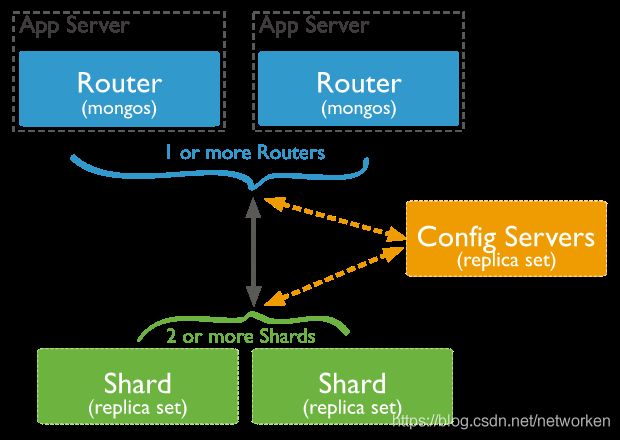MongoDB部署分片集群
MongoDB分片集群简介
在单机环境下,高频率的查询会给服务器 CPU 和 I/O 带来巨大的负担,基于这个原因,MongoDB 提供了分片机制用于解决大数据集的分布式部署,从而提高系统的吞吐量。一个标准的 MongoDB 分片集群通常包含以下三类组件:

- mongos,数据库集群请求的入口,所有的请求都通过mongos进行协调,不需要在应用程序添加一个路由选择器,mongos自己就是一个请求分发中心,它负责把对应的数据请求转发到对应的shard服务器上。在生产环境通常有多mongos作为请求的入口,防止其中一个挂掉所有的mongodb请求都没有办法操作。
- config server,为配置服务器,存储所有数据库元信息(路由、分片)的配置。mongos本身没有物理存储分片服务器和数据路由信息,只是缓存在内存里,配置服务器则实际存储这些数据。mongos第一次启动或者关掉重启就会从 config server 加载配置信息,以后如果配置服务器信息变化会通知到所有的 mongos 更新自己的状态,这样 mongos 就能继续准确路由。在生产环境通常有多个 config server 配置服务器,因为它存储了分片路由的元数据,防止数据丢失!
- shard,分片(sharding)是指将数据库拆分,将其分散在不同的机器上的过程。将数据分散到不同的机器上,不需要功能强大的服务器就可以存储更多的数据和处理更大的负载。基本思想就是将集合切成小块,这些块分散到若干片里,每个片只负责总数据的一部分,最后通过一个均衡器来对各个分片进行均衡(数据迁移)。
分片集群部署规划
节点IP、组件及端口规划:
| 主机名 | IP地址 | mongos-router | config-server | shard |
|---|---|---|---|---|
| mongodb01 | 192.168.92.80 | mongos-router:27017 | config-server:27018 | shard1:27019 shard2:27020 shard3:27021 |
| mongodb02 | 192.168.92.81 | mongos-router:27017 | config-server:27018 | shard1:27019 shard2:27020 shard3:27021 |
| mongodb03 | 192.168.92.82 | mongos-router:27017 | config-server:27018 | shard1:27019 shard2:27020 shard3:27021 |
部署说明:
- configServer配置服务器建议部署为包含3个成员的副本集模式,出于测试目的,您可以创建一个单成员副本集;
- shard分片请使用至少包含三个成员的副本集。出于测试目的,您可以创建一个单成员副本集;
- mongos没有副本集概念,可以部署1个、2个或多个。
- 本次部署使用3台服务器,部署3个mongos、3个configServer、以及3个分片,每个分片包含3个成员,都分布在不同服务器上。
二进制安装mongodb
以下操作在所有节点执行。
参考:https://docs.mongodb.com/manual/tutorial/install-mongodb-on-red-hat-tarball/
配置主机名
hostnamectl set-hostname mongodb01
hostnamectl set-hostname mongodb02
hostnamectl set-hostname mongodb03
配置主机名解析
cat > /etc/hosts <<EOF
192.168.92.80 mongodb01
192.168.92.81 mongodb02
192.168.92.82 mongodb03
EOF
集群目录规划:
- mongodb安装目录:/opt/mongodb
- 集群组件数据目录:/opt/mongdb/cluster
创建数据目录和日志目录
mkdir -p /opt/mongodb/cluster/{config,mongos,shard1,shard2,shard3}/{data,logs}
目录结构如下:
[root@mongodb01 ~]# tree /opt/mongodb/
/opt/mongodb/
└── cluster
├── config
│ ├── data
│ └── logs
├── mongos
│ ├── data
│ └── logs
├── shard1
│ ├── data
│ └── logs
├── shard2
│ ├── data
│ └── logs
└── shard3
├── data
└── logs
安装mongodb tar包所需依赖
yum install -y libcurl openssl xz-libs
下载mongodb二进制包并解压至/opt/mongodb
wget https://fastdl.mongodb.org/linux/mongodb-linux-x86_64-rhel70-4.4.4.tgz -P /tmp
tar -zxvf /tmp/mongodb-linux-x86_64-* -C /opt/mongodb --strip=1
配置环境变量
echo "PATH=$PATH:/opt/mongodb/bin" > /etc/profile.d/mongodb.sh
source /etc/profile.d/mongodb.sh
mongo --version
创建mongodb启动用户:
groupadd mongod
useradd -g mongod mongod
配置mongodb目录权限
chown -R mongod:mongod /opt/mongodb
所有节点安装rsync,方便分发配置文件
yum install -y rsync
修改对应组件配置文件
以下所有操作在第一个节点mongodb01执行。
下载并分发配置文件模板到各个目录:
wget https://raw.githubusercontent.com/mongodb/mongo/master/rpm/mongod.conf -P /opt/mongodb/
realpath /opt/mongodb/cluster/* | xargs -I {} cp /opt/mongodb/mongod.conf {}
修改configServer配置文件:
cat > /opt/mongodb/cluster/config/mongod.conf <systemLog:
destination: file
logAppend: true
path: /opt/mongodb/cluster/config/logs/mongod.log
# Where and how to store data.
storage:
dbPath: /opt/mongodb/cluster/config/data
journal:
enabled: true
# how the process runs
processManagement:
fork: true # fork and run in background
pidFilePath: /opt/mongodb/cluster/config/mongod.pid # location of pidfile
timeZoneInfo: /usr/share/zoneinfo
# network interfaces
net:
port: 27018
bindIp: mongodb01
sharding:
clusterRole: configsvr
replication:
replSetName: config
EOF
修改shard1分片配置文件
cat > /opt/mongodb/cluster/shard1/mongod.conf <systemLog:
destination: file
logAppend: true
path: /opt/mongodb/cluster/shard1/logs/mongod.log
# Where and how to store data.
storage:
dbPath: /opt/mongodb/cluster/shard1/data
journal:
enabled: true
# how the process runs
processManagement:
fork: true # fork and run in background
pidFilePath: /opt/mongodb/cluster/shard1/mongod.pid # location of pidfile
timeZoneInfo: /usr/share/zoneinfo
# network interfaces
net:
port: 27019
bindIp: mongodb01
sharding:
clusterRole: shardsvr
replication:
replSetName: shard1
EOF
修改shard2分片配置文件
cat > /opt/mongodb/cluster/shard2/mongod.conf <systemLog:
destination: file
logAppend: true
path: /opt/mongodb/cluster/shard2/logs/mongod.log
# Where and how to store data.
storage:
dbPath: /opt/mongodb/cluster/shard2/data
journal:
enabled: true
# how the process runs
processManagement:
fork: true # fork and run in background
pidFilePath: /opt/mongodb/cluster/shard2/mongod.pid # location of pidfile
timeZoneInfo: /usr/share/zoneinfo
# network interfaces
net:
port: 27020
bindIp: mongodb01
sharding:
clusterRole: shardsvr
replication:
replSetName: shard2
EOF
修改shard3分片配置文件
cat > /opt/mongodb/cluster/shard3/mongod.conf <systemLog:
destination: file
logAppend: true
path: /opt/mongodb/cluster/shard3/logs/mongod.log
# Where and how to store data.
storage:
dbPath: /opt/mongodb/cluster/shard3/data
journal:
enabled: true
# how the process runs
processManagement:
fork: true # fork and run in background
pidFilePath: /opt/mongodb/cluster/shard3/mongod.pid # location of pidfile
timeZoneInfo: /usr/share/zoneinfo
# network interfaces
net:
port: 27021
bindIp: mongodb01
sharding:
clusterRole: shardsvr
replication:
replSetName: shard3
EOF
修改mongos-router配置文件,注意mongos没有storage部分配置:
cat > /opt/mongodb/cluster/mongos/mongod.conf <systemLog:
destination: file
logAppend: true
path: /opt/mongodb/cluster/mongos/logs/mongod.log
# how the process runs
processManagement:
fork: true # fork and run in background
pidFilePath: /opt/mongodb/cluster/mongos/mongod.pid # location of pidfile
timeZoneInfo: /usr/share/zoneinfo
# network interfaces
net:
port: 27017
bindIp: mongodb01
sharding:
configDB: config/mongodb01:27018,mongodb02:27018,mongodb03:27018
EOF
分发配置到各个节点,注意,使用rsync复制能够保留文件目录权限
rsync -avzp /opt/mongodb/cluster 192.168.92.81:/opt/mongodb/
rsync -avzp /opt/mongodb/cluster 192.168.92.82:/opt/mongodb/
在mongodb02节点更新配置文件绑定地址
grep -rl bindIp /opt/mongodb/cluster/ | xargs sed -i 's#bindIp: mongodb01#bindIp: mongodb02#g'
在mongodb03节点更新配置文件绑定地址
grep -rl bindIp /opt/mongodb/cluster/ | xargs sed -i 's#bindIp: mongodb01#bindIp: mongodb03#g'
验证更新成功
grep -rn "bindIp: mongodb0" /opt/mongodb/cluster/
启动并初始化configserver
连接3个节点执行以下命令分别启动configServer
mongod -f /opt/mongodb/cluster/config/mongod.conf
连接到第一个节点mongodb01
[root@mongodb01 ~]# mongo --host mongodb01 --port 27018
初始化configServer副本集
rs.initiate(
{
_id: "config",
configsvr: true,
members: [
{ _id : 0, host : "mongodb01:27018" },
{ _id : 1, host : "mongodb02:27018" },
{ _id : 2, host : "mongodb03:27018" }
]
}
)
查看节点状态
rs.status()
启动并初始化shard分片
3个节点每个节点执行以下命令启动3个shard分片副本集
mongod -f /opt/mongodb/cluster/shard1/mongod.conf
mongod -f /opt/mongodb/cluster/shard2/mongod.conf
mongod -f /opt/mongodb/cluster/shard3/mongod.conf
连接到第一个shard分片并初始化
[root@mongodb01 ~]# mongo --host mongodb01 --port 27019
rs.initiate(
{
_id: "shard1",
members: [
{ _id : 0, host : "mongodb01:27019" },
{ _id : 1, host : "mongodb02:27019" },
{ _id : 2, host : "mongodb03:27019" }
]
}
)
连接到第二个shard分片并初始化
[root@mongodb01 ~]# mongo --host mongodb01 --port 27020
rs.initiate(
{
_id: "shard2",
members: [
{ _id : 0, host : "mongodb01:27020" },
{ _id : 1, host : "mongodb02:27020" },
{ _id : 2, host : "mongodb03:27020" }
]
}
)
连接到第三个shard分片并初始化
[root@mongodb01 ~]# mongo --host mongodb01 --port 27021
rs.initiate(
{
_id: "shard3",
members: [
{ _id : 0, host : "mongodb01:27021" },
{ _id : 1, host : "mongodb02:27021" },
{ _id : 2, host : "mongodb03:27021" }
]
}
)
查看各个分片副本集节点状态
rs.status()
启动并初始化mongos
3个节点启动mongos-router,注意启动时使用mongos命令而非mongod命令:
mongos -f /opt/mongodb/cluster/mongos/mongod.conf
连接到第一个mongos节点mongodb01并初始化
[root@mongodb01 ~]# mongo --host mongodb01 --port 27017
执行以下操作将3个分片副本集添加到集群:
sh.addShard( "shard1/mongodb01:27019,mongodb02:27019,mongodb03:27019")
sh.addShard( "shard2/mongodb01:27020,mongodb02:27020,mongodb03:27020")
sh.addShard( "shard3/mongodb01:27021,mongodb02:27021,mongodb03:27021")
查看mongos状态
sh.status()
查看当前节点运行的所有mongod进程:
[root@mongodb01 ~]# ps -ef | grep mongod | grep -v grep
root 37847 1 5 17:53 ? 00:01:43 mongod -f /opt/mongodb/cluster/config/mongod.conf
root 37993 1 3 18:01 ? 00:00:49 mongod -f /opt/mongodb/cluster/shard1/mongod.conf
root 38036 1 3 18:01 ? 00:00:48 mongod -f /opt/mongodb/cluster/shard2/mongod.conf
root 38079 1 3 18:01 ? 00:00:50 mongod -f /opt/mongodb/cluster/shard3/mongod.conf
root 38329 1 0 18:13 ? 00:00:06 mongos -f /opt/mongodb/cluster/mongos/mongod.conf
至此分片集群部署完成,接下来执行数据分片操作。
为数据库启用分片
在分片集合之前,必须为集合的数据库启用分片,连接任意一台mongos节点shell,以mongodb01节点为例。
mongo --host mongodb01 --port 27017
创建testdb数据库
use testdb;
为集合启用分片
为testdb数据库启用分片
sh.enableSharding("testdb")
为order集合设置分片规则
sh.shardCollection("testdb.order", {"_id": "hashed" })
插入1000条数据进行验证:
use testdb
for (i = 1; i <= 1000; i=i+1){
db.order.insert({'price': 1})
}
查看插入的数据量
db.order.find().count()
访问3个分片查看数据量
[root@mongodb01 ~]# mongo --host mongodb01 --port 27019
shard1:PRIMARY> use testdb
switched to db testdb
shard1:PRIMARY> db.order.find().count()
336
[root@mongodb01 ~]# mongo --host mongodb01 --port 27020
shard2:PRIMARY> use testdb
switched to db testdb
shard2:PRIMARY> db.order.find().count()
326
[root@mongodb01 ~]# mongo --host mongodb01 --port 27021
shard3:PRIMARY> use testdb
switched to db testdb
shard3:PRIMARY> db.order.find().count()
338
